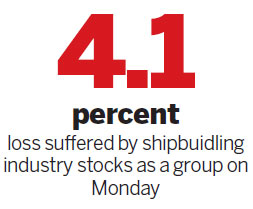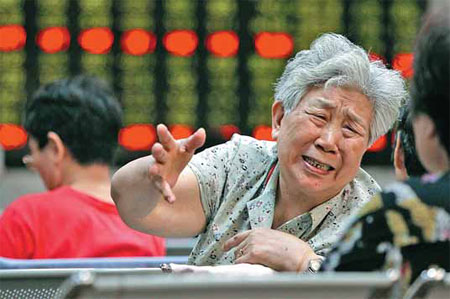Stocks sink on profit slowdown, audit plan
Updated: 2013-07-30 08:11
By Huang Tiantian and Yang Ziman in Beijing and Gao Changxin in Hong Kong (China Daily)
|
||||||||
|
Many individual investors were upset after China's benchmark stock index dropped below the psychologically important 2,000-point mark again on Monday. The Shanghai Composite Index closed at 1,976.31 points, down 1.72 percent from the previous session. Ding Ting / Xinhua |

Nervous investors drove down the Chinese stock market on Monday, reacting to discouraging news about industrial companies' first-half profit growth and a State Council call for a nationwide audit of local government debt.
The Shanghai Composite Index fell 1.72 percent, or 34.54 points, to 1,976.31 points, the largest single-day fall since July 8. The loss took the benchmark index below the 2,000-point level.
The Shenzhen Component Index had an even worse day, sliding 2.23 percent to 7,668.54 points.
The Hang Seng China Enterprises Index fell 1.17 percent.
The National Bureau of Statistics announced over the weekend that industrial profits increased 11.1 percent in the first six months of the year, compared with growth of 12.3 percent a year earlier.
"The modest easing in industrial profit growth comes amid ongoing sluggishness in the manufacturing environment," said Zhu Haibin, the chief economist of JPMorgan Chase & Co. "And it will affect the manufacturing sector."
Reacting to the news, the shipbuilding industry as a group fell by 4.1 percent on Monday, the biggest loss among the boards. Industry leader CSSC Jiangnan Heavy Industry Co Ltd was down 9.71 percent in the afternoon session.
The market was also undermined by news that the central government ordered the National Audit Office to conduct a review of local government borrowings. Banks in particular took a hit on the development.
Bank of China Ltd, China Construction Bank Corp, Industrial and Commercial Bank of China Ltd and Agricultural Bank of China Ltd lost 1.5 percent, 1.86 percent, 0.51 percent and 1.61 percent, respectively.
"Railway and property shares will bear the brunt of Beijing's latest round of local government debt audits," said Yang Shaohua, an A-share strategist with Shenyin & Wanguo Securities Co Ltd.
"That's because most of the funds raised by local government financing platforms went to the two sectors. Industries in the upstream of the two sectors will also be affected, including cement and steel," said Yang.
"The audit is Beijing's effort to get a full picture of the country's debt problems as it tries to speed up structural reforms," Yang said.
According to the audit office, the last audit, released in 2011, showed local government debts of 10.7 trillion yuan ($1.75 trillion) as of the end of 2010.
The impact of the audit on the equity market will be short-term.
"Overall, the A-share market has yet to hit bottom. Investors are demanding a higher risk premium in the face of government reforms, which has helped render the most significant slowdown in China in decades," Zhu added.
The Growth Enterprise Market, which saw "an irrational rally" earlier this year, presents the greatest downside risk, Yang said.
Shares of large-cap companies on the main board have already priced in 70 percent of the risks, whereas shares of many small-cap companies have stayed buoyant.
"Shares on the (growth market) are expected to take a hit in the second half. The biggest risk in the second half lies with liquidity," Yang added.
Contact the writers at huangtiantian@chinadaily.com.cn
(China Daily USA 07/30/2013 page13)
Most Viewed
Editor's Picks

|

|

|

|

|

|
Today's Top News
China-US talks yield 'incremental progress'
Spain investigators: Train driver was on phone
Apple faces more staff abuse charges
Spending surge for renewables
Beijing and Canberra to resume trade talks
Top leader vows to meet growth target
2,290 disciplined for extravagance
Japan diplomat seeks to mend ties
US Weekly

|

|
















